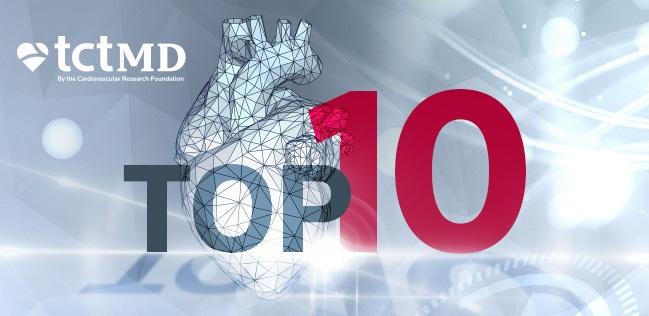TCTMD’s Top 10 Most Popular Stories for April 2019
FDA approvals and alerts dominated the list, along with stories on informed consent, PCI in the elderly, left main CABG, and more.

The US Food and Drug Administration approval of the Lotus Edge TAVR device was the top story for April 2019, but the list was otherwise dominated by stories relating to coronary interventions and primary prevention of CVD. Two FDA safety alerts helped round out this month’s top 10.
1. FDA Approves Lotus Edge, Ushering Third Device Into US Market
The decision marked the approval of the first fully repositionable and retrievable TAVR device in the United States.
2. Patients Retain Little From Cath Lab Informed-Consent Conversations
Shared decision-making may be upping patients’ satisfaction but not their knowledge of procedural risks and benefits, experts say.
3. Two Pediatric Cardiac Catheters Recalled for Defective Balloons
The FDA says there’s been one serious injury, but no deaths, due to balloons deflating, fragmenting, or detaching.
4. PCI on the Rise Among the Elderly, Who Are Reaping Survival Gains
“We shouldn’t age discriminate,” an expert agreed, but he cautioned against reading too much into the unadjusted outcomes data.
5. EXCEL Insights: CABG Outcomes for Left Main CAD Have Improved Substantially
The improvement likely isn’t due to changes in the surgery but rather to greater use of optimal medical therapy, say experts.
6. Help, Not Harm: Omega-6 PUFAs Linked With Lower Risk of CVD Events
Concerns that omega-6 PUFAs may be pro-inflammatory and prothrombotic should be allayed, investigators say.
7. People Who Forgo Breakfast May Carry a Higher Risk of CV Death
Eating breakfast may be a simple way to promote cardiovascular health, a researcher says.
8. Women Have Higher Risk of TAVR-Related Pericardial Complications
The study helps identify at-risk patient populations, which is important as TAVR moves into lower-risk cohorts, an expert says.
9. Will Less Aggressive Lp(a) Targets Do the Trick? Time and Clinical Trials Will Tell
A new analysis hints that trials should enroll patients with Lp(a) levels of > 100 mg/dL and more modest cuts will be meaningful.
10. FDA Warns Against Off-label Use of Wingspan Stent System
The neurointerventional device for intracranial stenosis ups the risk of stroke and death when used for nonapproved indications.
Shelley Wood was the Editor-in-Chief of TCTMD and the Editorial Director at the Cardiovascular Research Foundation (CRF) from October 2015…
Read Full Bio

Comments